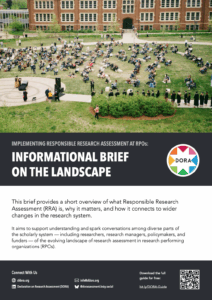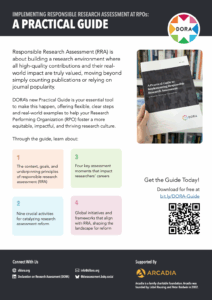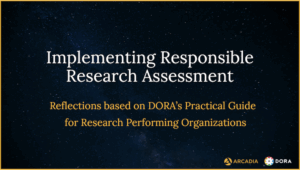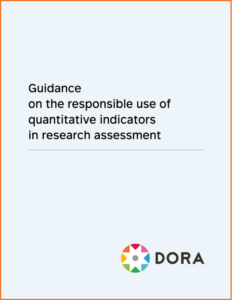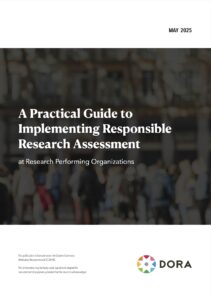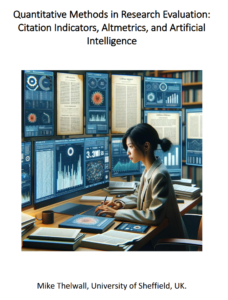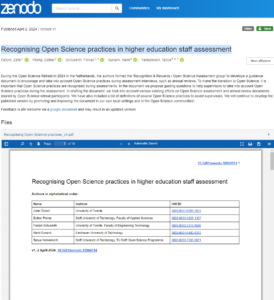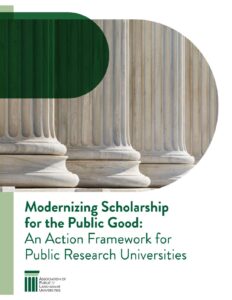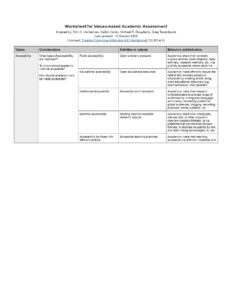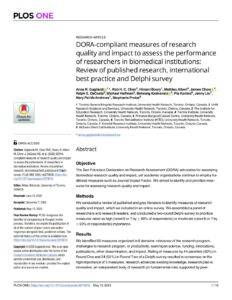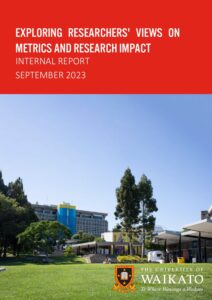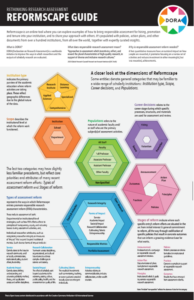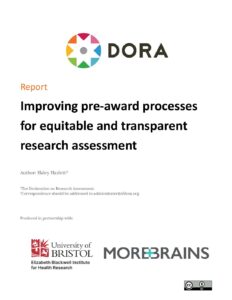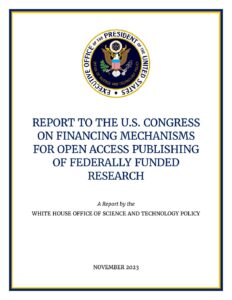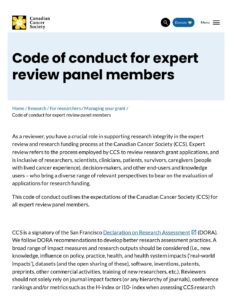A collection of materials to facilitate the development of responsible research and researcher assessment policies and practices. For DORA produced resources, use the filter below or go to DORA Reports.
Search and Filter
Resource type
Intended audience
Case studies
DORA-produced
This case study shares the Major R&D Outcome-Oriented Evaluation System implemented by the Chinese Academy of Sciences (CAS) in recent years which emphasized impactful research and moved beyond purely quantitative metrics.
Advocacy resourcesPolicies and guidanceTools
DORA-produced
For: Research institutes
2025
This is part of DORA’s toolkit of resources to support academic institutions that are improving their policies and practices. Find other resources in the toolkit here. “Implementing Responsible Research Assessment at RPOs: Informational Briefs from the Practical Guide” is a set of three tailored resources designed to support diverse audiences connected to Research Performing Organizations (RPOs)…
Advocacy resourcesPolicies and guidanceTools
DORA-produced
For: Research institutes
2025
This is part of DORA’s toolkit of resources to support academic institutions that are improving their policies and practices. Find other resources in the toolkit here. “Implementing Responsible Research Assessment at RPOs: Quick-Reference Sheets from the Practical Guide” is a set of concise, action-oriented resources designed to support Research Performing Organizations (RPOs) in adopting and advancing…
Advocacy resources
DORA-produced
For: Research institutes
2025
We are pleased to share two comprehensive slide decks designed to support the implementation of A Practical Guide to Implementing Responsible Research Assessment at Research Performing Organizations (more here). These slides are freely available for download and can be adapted to suit your specific needs. Both include detailed speaker notes to facilitate delivery. Institutional Presentation…
Advocacy resourcesPolicies and guidancePosition papers
DORA-produced
For: FundersJournals and publishersProfessional societiesResearch institutesResearchers
2024
This document provides guidance on the use of several indicators (sometimes called metrics) used in research assessment: the Journal Impact Factor and other measurements of journals, citation counts, h-index, field-normalized citation indicators, and altmetrics. Five principles guide the use of these metrics: be clear, be transparent, be specific, be contextual, and be fair.
Advocacy resourcesPolicies and guidanceTools
DORA-produced
For: Research institutes
2025
"A Practical Guide to Implementing Responsible Research Assessment at Research Performing Organizations" provides action-oriented guidance, resources, and illustrative examples, for research performing organizations (RPOs) who are looking to shape and deliver responsible research assessment (RRA) practices. This includes RPOs who are looking to create an RRA strategy, organizations wanting to reform existing practices, and organizations simply wanting to take steps towards more holistic and inclusive approaches to research assessment.
Case studies
DORA-produced
Aalborg University (AAU) in Denmark has embarked on an ambitious reform of its research assessment practices, aiming to move beyond traditional journal-based metrics and towards a more holistic and mission-driven approach. As an institution committed to problem-based learning and interdisciplinary collaboration, AAU sought to align research evaluation with its broader strategic goals. With approximately 3,200…
Case studies
DORA-produced
In January 2021, the University of Calgary was the first Canadian university to sign DORA, cementing an ongoing commitment to societal impact, recognition of diverse forms of scholarship, Indigenous engagement, equity, diversity and inclusion and rigorous assessment and reporting of impact to parties within and beyond the University. The process of implementing DORA has been a…
Case studies
DORA-produced
The University of Tokyo, established in 1877, is Japan’s oldest and largest national university, with three main campuses: Hongo, Komaba, and Kashiwa. The university’s major research areas span a wide range of disciplines, including natural sciences, engineering, social sciences, humanities, and interdisciplinary fields. In 2023, UTokyo became the first Japanese university to sign DORA. This…
Advocacy resourcesTools
For: FundersProfessional societiesResearch institutesResearchers
2025
These short educational videos in animated and talking head formats provide an introduction to the h-index, a commonly used scholarly metric for assessing authors’ publication output and citation impact. The videos explain how the h-index is calculated, how it is used to assess researchers, and its key limitations. They highlight important considerations, such as disciplinary…
Advocacy resourcesInitiativesTools
For: FundersJournals and publishersResearch institutes
This book critically analyses the value of citation data, altmetrics, and artificial intelligence to support the research evaluation of articles, scholars, departments, universities, countries, and funders. It introduces and discusses indicators that can support research evaluation and analyses their strengths and weaknesses as well as the generic strengths and weaknesses of the use of indicators…
Good practicesPolicies and guidance
For: FundersResearch institutes
2024
This resource compiles questions about open scholarship that pertain to assessment of research, education, outreach, and leadership. The questions for each section are accompanied by definitions of terms used in the questions and links to resources. The authors note that these questions were developed in the context of assessment practices in The Netherlands, but note…
Good practicesPolicies and guidance
For: FundersResearch institutes
2020
This resource compiles questions about open scholarship that pertain to assessment of research, education, outreach, and leadership. The questions for each section are accompanied by definitions of terms used in the questions and links to resources. The authors note that these questions were developed in the context of assessment practices in The Netherlands, but note…
Good practicesInitiatives
For: Research institutes
2023
For over 150 years, public research universities have advanced public interest through education, innovation, and community engagement. The Association of Public and Land-grant Universities (APLU) has created an initiative to promote the continuation of these values while modernizing them to give a greater consideration to diversity, equity, inclusion, and justice. A subsection of this initiative…
Tools
For: Research institutes
2023
This worksheet was created as a guide for academic institutions and departments to aid in modernization of their promotion, tenure, and review processes. It lays out a set of values that institutions can take into consideration during evaluations, and offers considerations, activities or outputs that may be associated with each value, and behavioral indicators that…
Good practicesJournal articles
For: Journals and publishersResearch institutes
2023
This paper reviewed existing literature and international best practices and established consensus by Delphi survey on 10 key measures for assessing research quality and impact that align with DORA values. These measures were chosen from a pool of 50 compiled measures that emphasize diverse and holistic evaluations of research performance beyond traditional metrics like journal…
Advocacy resources
For: FundersJournals and publishersProfessional societies
2023
This internal report for the University of Waikato investigates researchers’ perspectives on metrics and their influence on research impact, highlighting a multifaceted view of the role these metrics play in the academic landscape. While researchers generally acknowledged the usefulness of metrics, they were concerned about the over-reliance on these metrics, which can lead to a…
Good practicesJournal articles
For: Research institutes
2024
This paper examines how to appropriately recognize and reward quality research. It critiques the overreliance on traditional quantitative indicators like journal impact factor and citation counts in evaluating scientific achievements. These metrics often fail to capture the true value and impact of research and can lead to undesirable behaviors that hinder scientific progress. The authors…
Case studies
DORA-produced
In 2022, the Department of Psychology at the University of Maryland underwent a complete overhaul of their evaluation policies, stemming from their motivation to address reproducibility issues in the field and develop more transparent and inclusive evaluation policies. The department chair began this process with DORA’s principles in mind, working alongside administration, faculty, and a…
Policies and guidanceTools
DORA-produced
For: Research institutes
2024
A one page tool that describes the six ways that entries are characterized in the Reformscape dataset. 1. Institution type. 2. Scope. 3. Populations. 4. Career decision. 5. Type of assessment reform. 6. Stages of reform. Part of "Rethinking research assessment" series.
Position papers
DORA-produced
For: Funders
This is a short report summarizing the key takeaways from a workshop co-organized by the San Francisco Declaration on Research Assessment (DORA), the University of Bristol, Elizabeth Blackwell Institute for Health Research, and the MoreBrains Cooperative. The aim of the online workshop was to develop actions to improve the processes that take place before research is…
Good practicesJournal articles
For: Journals and publishersResearch institutes
2024
This paper explores the relationship between open access (OA) publishing and citation diversity, offering insights into how accessibility shapes scholarly communication. Regarding responsible research assessment, open scholarship is largely important, helping to evaluate work on its own merits when it is openly accessible. The authors determined that freely available scholarly publications attract citations from a…
Good practicesPolicies and guidance
For: Journals and publishersResearch institutes
2023
This report from the White House Office of Science and Technology Policy (OSTP) discusses financing mechanisms for open access publishing of federally funded research. Overall, the report underscores the importance of financing mechanisms to support open access publishing of federally funded research, emphasizing the need for continued efforts to ensure broad access to scientific knowledge…
Good practicesPolicies and guidance
For: Journals and publishersResearch institutes
2023
Reviewers play a critical role in upholding research integrity within the expert review and funding process at the Canadian Cancer Society (CCS). The expert review encompasses a diverse group ranging from researchers, clinicians, patients, survivors, caregivers, decision-makers, and knowledge users, collectively offering a multifaceted evaluation of research grant applications. In alignment with DORA, CCS advocates…
Advocacy resourcesGood practicesPolicies and guidance
For: FundersProfessional societiesResearch institutes
2022
This document from UNESCO is a roadmap for higher education, prepared for the “3rd World Higher Education Conference (WHEC2022).” Within the roadmap are “signposts for co-creating more open, inclusive, equitable and collaborative higher education systems that democratize access and knowledge.” Recognizing the evolution of and advancements in higher education, UNESCO has outlined 5 sections discussing…



